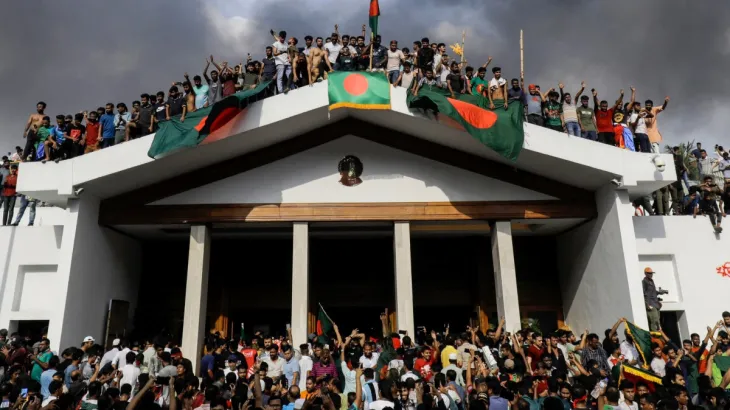The significance of the garment industry in Bangladesh’s economy can be gauged from the fact that the ready-made garment sector contributes 83 percent of the total export earnings of the country. This industry, vital to the nation’s economic health, is currently facing unprecedented challenges amid severe political turmoil.
Out of fear of vandalism and subsequent losses amid the current spell of violence, the Bangladesh Garment Manufacturers and Exporters Association (BGMEA) instructed all factory owners to keep their units shut until further notice. The message was circulated among the members through WhatsApp, said Md Ashikur Rahman Tuhin, a director of the BGMEA.
This complete closure, prompted by worsening political instability, is seen as a major disruption to Bangladesh’s key industries, affecting major apparel giants such as H&M and Zara.
According to the World Trade Organisation’s 2023 data, Bangladesh exported $38.4 billion worth of clothes. On a global level, Bangladesh ranks third after China and the EU in terms of garment exports. According to the BBC, H&M sources garments from over 1,000 factories in Bangladesh, while Zara has key manufacturing clusters based in the country. The shutdown of all garment factories across Bangladesh casts a cloud of uncertainty over the reopening of these crucial units. Several reports have already described looting incidents in Dhaka and other major cities.
This shutdown comes as another blow to the sector, which had already experienced a four-day closure during the first round of violence two weeks ago. This period is particularly crucial as it is the peak season for Christmas shipments and for taking work orders for the upcoming summer and spring seasons.
During the mid-July violence, exporters faced communication challenges with their business partners abroad due to an internet blackout. The ongoing violence has led to the shutdown of the majority of garment factories yesterday, the first day of a countrywide non-cooperation movement organized by the Anti-Discrimination Student Movement.
The violence has resulted in at least 73 deaths, including 14 policemen, with dozens injured in fierce clashes in Dhaka and other parts of Bangladesh. Over 400 garment factories in Narayanganj, Narayanganj BSCIC, and Fatullah areas were closed, although some units operated for a short time in the morning.
Mohammad Hatem, executive president of the Bangladesh Knitwear Manufacturers and Exporters Association (BKMEA), reported that some factories were operational in Rupganj and Araihazar areas of Narayanganj district. However, factories in Ashulia, Savar, Maona, Tongi, and Chattogram that started production in the morning were shut down after student protests began, leading to vandalism in some units.
At least six garment factories were vandalized in Narayanganj BSCIC and its adjacent areas, Hatem said, adding that other factory owners have shut down their units fearing further escalation of violence. Hatem confirmed that workers left their workplaces peacefully after the shutdown.
Factories in Konabari and Kashimpur under Gazipur district were also shut down, although they were opened in the morning, said Arshad Jamal Dipu, vice-president of the BGMEA. The shutdown was anticipated to avoid violence, he said, but he could not confirm how many factories were closed.
Factory owners fear another internet shutdown, as they faced significant losses during the previous blackout, which hindered communication with foreign retailers and brands. Exporters struggled to communicate online, affecting business deals and meetings.
Moreover, this period is critical for bond renewal of export-oriented garment factories, and already seven factories have reported difficulties in renewing bond licenses due to the crisis, Dipu said. Owners are also facing trouble in garment shipments and importing raw materials.
Nazma Akter, president of Sammilito Garment Sramik Federation, a workers’ platform, said BGMEA leaders met with union leaders on Saturday, urging them to be more responsible during the crisis to ensure the safety of garment factories. Owners announced the closure fearing the spread of violence in the sector.
Garment exporters fear that if their workers join the ongoing movement across the country, it will further damage the sector, which was hampered for four days during mid-July violence. The sector also suffered due to a five-day internet blackout, hindering communication between garment suppliers and international retailers and brands, leading to missed business deals and meetings.
Last week, international retailers and brands expressed concern at a meeting with BGMEA leaders, flagging difficulties in communication with their headquarters and local suppliers. The months of July, August, and September are peak seasons for both shipment of goods for next Christmas and booking work orders from international retailers and brands for the next summer and spring seasons.
BGMEA has reported losses of Tk 6,400 crore due to the shutdown and internet blackout, while the Bangladesh Textile Mills Association estimates losses at $58.8 million.

